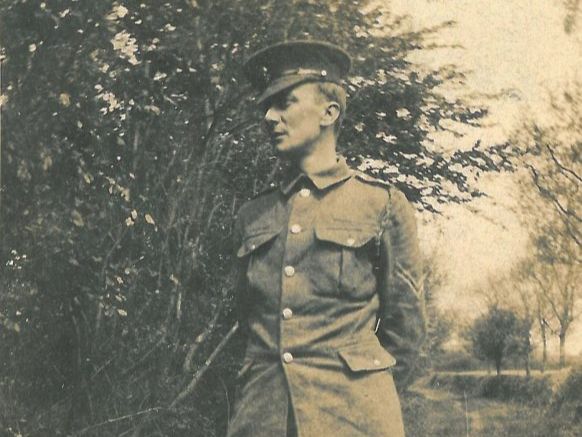Your weekly poem, Apr. 7: “Adlestrop” by Edward Thomas

A poem selected by our director Nicholas Allen, Baldwin Professor in Humanities
Dear friends,
Since we last visited, I have spent what time I can walking in short circuits around our neighborhood, intent for a brief while, and at a safe distance from my fellows, on the glory that is Athens in Spring. Everywhere are marvels, the dogwoods afloat on blue skies, the azaleas in blossom, the air heavy with the slow rolls of carpenter bees.
Poetry is an art of attention, and nature its first love. If the perimeter of our own wandering is now diminished, the local world’s wonders have only increased. Think, next time you are out, of the myriad life of a single tree, a canopy, a branch, cell upon cell, insect on leaf, bird in flight, and you with the freedom to see it.
All of which led me to cross the Irish Sea to Edward Thomas, born in London in 1878 to a family of Welsh origin. Thomas is one of the great lyric poets, a friend of Robert Frost when Frost lived in England and revered by Michael Longley. Troubled by depression, he lived in rural Kent with his wife Helen before his enlistment in the Artists’ Rifles in 1915.
“Adlestrop” is one of the greatest poems of the English countryside the language has, and still sings of meadowsweet and blackbird after a century of great advances, and great suffering. Written after Thomas stopped at the Cotswold village station with his family in June 1914, it was published three weeks after he died on the first day of the Battle of Arras in April 1917, just two months after he arrived in France.
A closing footnote to Edward Thomas’s story is Helen’s later kindness to the composer and poet Ivor Gurney, who served with the Gloucesters and was twice wounded in France, once gassed. Helen visited Gurney in hospital after the war, where he remained in distress. The first time she found Gurney unresponsive. “The next time I went,” Helen wrote, “I took with me Edward’s own well-used Ordnance Survey maps of Gloucestershire, where he had often walked. This proved to have been a sort of inspiration, for Ivor Gurney at once spread them out on his bed and he and I spent the whole time I was there tracing with our fingers the lanes and byeways and villages of which he knew every step and over which Edward had walked. He spent that hour re-visiting his beloved home, spotting a village or a track, a hill or a wood and seeing it all in his mind’s eye. He trod, in a way that we who were sane could not emulate, the lanes and fields he loved, his guide being his finger tracing the way on the map. It was deeply moving, and I knew that I had hit on an idea that gave him more pleasure than anything else I could have thought of.”
Shelter need not mean isolation and I wish you all peace, good health and the company of a book, lit by the life of Spring.
As always,
Nicholas
“Adlestrop”
by Edward Thomas
Yes. I remember Adlestrop
The name, because one afternoon
Of heat, the express-train drew up there
Unwontedly. It was late June.
The steam hissed. Someone cleared his throat.
No one left and no one came
On the bare platform. What I saw
Was Adlestrop—only the name
And willows, willow-herb, and grass,
And meadowsweet, and haycocks dry,
No whit less still and lonely fair
Than the high cloudlets in the sky.
And for that minute a blackbird sang
Close by, and round him, mistier,
Farther and farther, all the birds
Of Oxfordshire and Gloucestershire.
